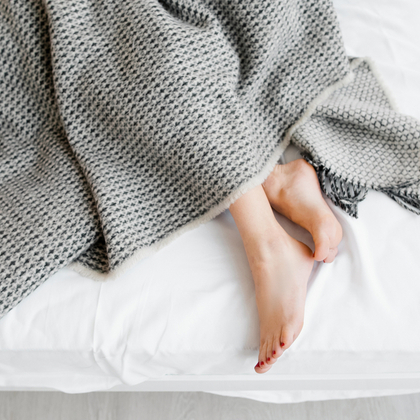
Despite the science changing, many people still believe sleep is a luxury – and that our body and mind lay dormant during sleep. But this couldn’t be further from the truth.
Sleep affects every physiological system in the body. It’s the single most effective thing we can do to reset our brain and body health every day. Sleep is an investment for our lifespan and healthspan. And yet, many people still struggle to get enough of it each night.
Fortunately, there are many ways to improve sleep quality. Here, we explore how you can sleep better.
What causes poor sleep quality?
Sleep is complicated. And the causes of poor sleep quality are multifactorial.
Mental health challenges are often responsible for sleep issues. Anxiety, stress, and depression all have bidirectional relationships with sleep: a lack of sleep can exacerbate or lead to mental health disorders, and mental health disorders can contribute to or cause sleep issues.

Poor sleep hygiene, sleep disorders, and other chronic health conditions can also precipitate poor sleep quality.
How can I improve my sleep quality?
The good news is that improving your sleep quality could be as simple as optimising your sleep hygiene and changing your daily habits.
Take in the morning sunlight
Good sleep begins the moment you wake up. Exposure to morning sunlight supports sleep by regulating your 24-hour internal body clock or circadian rhythm.
Research has found that individuals exposed to greater amounts of light in the morning – between 8 am and noon – fall asleep quicker than those exposed to significantly less natural light in the morning1.
Try to get 20-minutes of direct, unprotected sun every morning. You could have your breakfast outside or take an active commute to work.
By the same token, avoid using blue-light-emitting devices 90-minutes before bed. Blue light suppresses the sleep hormone melatonin and throws your sleep-cycle out of whack.
Enjoy caffeine before midday
Caffeine is widely known to disrupt sleep. This substance has a half-life of 5-6 hours and a quarter-life of 10-12 hours, meaning if you have a cup of coffee at noon, a quarter of that caffeine will still be in your brain at midnight, and you won’t be able to sleep as well as you could.
Caffeine impacts your sleep in three ways: it can delay sleep onset (the time it takes to fall asleep); it can make your sleep more fragile (meaning you’re more susceptible to night-time arousals); and it can affect the electrical, brain-wave quality of your sleep, so you’ll experience less deep sleep and wake un-refreshed2.
However, it’s not just the dose; the timing also makes the poison. Try to have your caffeine before midday in mild to moderate amounts (less than 3 cups of coffee) to improve sleep quality.
But there’s no one-size-fits-all. Some individuals are extremely sensitive to coffee. Even an early morning cup of coffee can affect sleep in the evening.
Exercise more
Regular exercise is an important pillar of health – and it’s especially important for good sleep hygiene.
Movement improves sleep quality by physically tiring the body and reducing sleep onset) 3.
Additionally, exercise supports sleep by increasing your core body temperature4. After around 30 to 90 minutes, your core temperature begins to fall – and this drop naturally induces sleepiness.
Regular exercise also serves to protect your emotional health, reducing stress and anxiety, both of which commonly disrupt sleep5.
Try exercising for 30-minutes most days of the week. However, consider limiting vigorous exercise to the morning or afternoon; the body-heating effects of intense, late-night physical activity may prevent you from sleeping.
Don’t eat too late
Eating your meal earlier in the evening will improve sleep quality. The digestive tract needs some distance after food consumption to prevent uncomfortable symptoms, like acid reflux, constipation, and bloating from keeping you awake. Certain foods, such as sugar and saturated fats, can also interfere with your sleep6.
Always leave between 2 to 3 hours after your last meal – preferably by 7 pm – before going to bed. This will allow enough time for digestion to take place.
Meditate
Meditation is another powerful tool to facilitate sleep. A regular meditation practice encourages you to be less in your head and more grounded in the present moment, reducing stress and anxiety and help relax the body before bed.
Evidence suggests mindfulness meditation improves sleep quality and reduces daytime disturbances in those with chronic insomnia7.
Meditation for insomnia and sleep troubles typically involves conscious awareness and breathing. These 6 mindfulness and relaxation techniques to help you sleep are an excellent place to start.
Try aromatherapy
Aromatherapy has long played a role in sleep and relaxation. Although many essential oils support rest, lavender is the most widely used since it produces a natural sedative effect.
In a 2016 study on students who experienced regular sleep disturbances, researchers found lavender inhalation positively affected daytime vibrancy, energy, and sleep quality and positioned it as an effective natural aid for insomnia8.
For easy inhalation, you could try using an essential oil diffuser, making a DIY pillow spray, or adding a few drops to a warm bath.
Don’t lie in bed for longer than 25 minutes
Optimising your bedroom to make it a place of rest is a vital component of good sleep hygiene. Tossing and turning in bed means your brain starts associating your ‘bed’ and ‘bedroom’ with wakefulness, not restfulness.
If you can’t sleep after 25-minutes, get out of bed and go to a different room. In dim lighting, do some gentle stretching, yoga, reading. Don’t check your phone; don’t eat – this will trigger your body to wake up. Only return to bed when you feel sleepy – there’s no time limit on this. Gradually, your brain will relearn the association that your bed is always a place of solid, sound, restful sleep.
It can help to reflect on this analogy: we never sit at the dining table waiting to get hungry, so why lie in bed waiting to get sleepy?
Many things get in the way of a good night’s sleep. But we hope the simple strategies above can help improve your sleep hygiene and ensure you wake energised and refreshed. If you want to learn how to get better sleep quality, visit the rest of our sleep hub.
References:
- Figueiro. M., Steverson. B., Heerwagen. J., Kampschroer. K., Hunter. C., Gonzales. K., Plitnick. B. & Rea. M.(2017). The impact of daytime light exposures on sleep and mood in office workers. Sleep Health. 3(3), 204-215.?
- O'Callaghan, F., Muurlink, O., & Reid, N. (2018). Effects of caffeine on sleep quality and daytime functioning. Risk management and healthcare policy, 11, 263–271. ?
- Dolezal, B. A., Neufeld, E. V., Boland, D. M., Martin, J. L., & Cooper, C. B. (2017). Interrelationship between Sleep and Exercise: A Systematic Review. Advances in preventive medicine, 2017, 1364387.
- Dolezal, B. et al. (2017). Interrelationship between Sleep and Exercise,1364387.
- Callaghan P. (2004) Exercise: a neglected intervention in mental health care? J Psychiatr Ment Health Nurs. 11(4), 476-83.
- Crispim. C., Zimberg. I., dos Reis. B., Diniz. R., Tufik. S. & de Mello. M. (2011). Relationship between Food Intake and Sleep Pattern in Healthy Individuals. Journal of Clinical Sleep Medicine.?
- Ong, J. C., Manber, R., Segal, Z., Xia, Y., Shapiro, S., & Wyatt, J. K. (2014). A randomized controlled trial of mindfulness meditation for chronic insomnia. Sleep, 37(9), 1553–1563.
- Goel. N., Kim. H. & Lao. R.. (2005). An Olfactory Stimulus Modifies Nighttime Sleep in Young Men and Women. Chronobiology International. 22(5), 889-904.
Related Posts

Olivia
Olivia Salter has always been an avid health nut. After graduating from the University of Bristol, she began working for a nutritional consultancy where she discovered her passion for all things wellness-related. There, she executed much of the company’s content marketing strategy and found her niche in health writing, publishing articles in Women’s Health, Mind Body Green, Thrive and Psychologies.
View More



